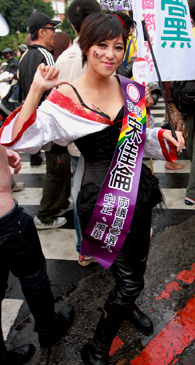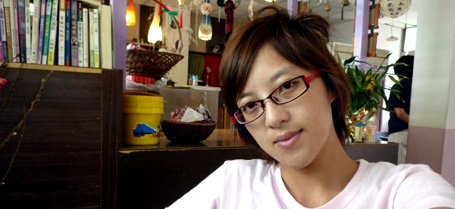Song Jia-lun (宋佳倫) is a Green Party candidate for the Zhongzheng-Wanhua districts in Taipei City. Nicknamed SM Queen, Song is reportedly a self-professed dominatrix and widely known to be a prominent member of the BDSM Company community group which holds lectures and meetings to raise awareness of and destigmatise sadomasochism.
In an interview with the Taipei Times, she says she advocates the legalisation of the sex industry because it’s fair for people to utilise their “natural talents” to get by. “If I could take on a job as a dominatrix legally, that would be a highly specialised job with a hefty salary,” said the postgraduate student in psychology. “Instead, I am forced to toil away in low-pay, contract jobs.”
But it’s not all about sex or BDSM rights, Song, who is running in the Taipei municipal elections for the first time, has built her campaign around addressing issues related to structural poverty, exploitation of workers, rights of the homeless, and challenges facing young people.
Song Jia-lun (宋佳倫)
Green Party Taiwan (台灣綠黨)
Member since: July 2010
Age: 27
Occupation: Postgraduate student in psychology
Contesting in: Zhongzheng-Wanhua District(中正萬華區), Taipei City
æ: How did you come to be involved in politics and why are you running for council member?
Jia-lun: Just this year in Taiwan, I’ve noticed an increase in many problems caused by the environment, working class and social class issues. I, as a person who is living in urban city, am affected by all these problems. I found that I couldn’t stand by and do nothing any longer. Many friends, who are my peers, and I have been involved in civil society for several years. This year, we've come to realise that we’re facing a serious impediment and all these issues are related to politics. We feel that the social movement has to get directly involved within the political system to negotiate (ideas, concepts, policies and etc.) with those people who are in that system already. So we decided to take the plunge.
But when I started to think about it seriously, I found many problems. For example, in Taiwan, to run in the election campaign for city councillor, the candidate has to put down a 200,000 NTD (US$6,600) deposit. This is an institutionalised economic barrier to entry. The fact that the majority of young people are unable to afford this is our biggest disadvantage and this is what we hope to change. This restriction has deprived us of the power to decide on the allocation of social resources. All this is making us upset and frustrated!
My friend Wang Chung-Ming, who is also a member of Green Party, wanted to run for the New Taipei City Councillor election and that inspired me to contemplate joining politics myself. We used to think our political scene is getting nowhere and a hopeless mess, but now here’s a chance to make it better for ourselves.
æ: What do you think are the pros and cons in being an openly gay candidate? Do you find the mainstream public to be accepting of yourself and other openly gay candidates?

Jia-lun: During the campaign, first and foremost, I'm a candidate from Green Party. Second, the poverty issue and challenges of young people are my priorities. The gender issue doesn’t feature that much while I’m communicating with citizens. Even if we touch on gender issues, the audience generally tends to have little reaction. This probably reflects what the average Taiwanese attitude about gender issues; it’s just not an issue for public discourse. So for me, I feel that the resistance against a tongzhi (gay) candidate like myself is mild.
On the other hand, this identity seems to give me more media exposure. For instance, I’ve been nicknamed SM Queen. My tongzhi identity didn’t draw as much attention as Chung-Ming’s gay identity did. It’s hard to deny that Taiwan’s media prefers to view my SM Queen status as some form of “exotism.” So my intention to educate the public about BDSM has not achieved much. But Chung-Ming’s gay news angle really catches many Tongzhi electorates’ attention. But this might be also due to the gay men being more politically conscious than the lesbians in Taiwan. (This is only my personal guess.)
æ: Are electorates ready for a LGBT candidate?
Jia-lun: For me, I don’t really care if the Taiwanese are ready. If participating in politics is an action for social minorities to fight and to gain political influence/clout, then being an openly gay person or as a SM Queen is coincidetal, or even a matter of fact. Or you might say it’s a consequence of my being queer that I feel disadvantaged which then propels me to be directly involved in politics to try to change my environment.
æ: What do you think are the three most important LGBT-related issues facing the city that you would address if you’re elected? What do you think are the three most important non-LGBT-related issues facing the city that you would address if you’re elected?
Jia-lun: For me, “Tongzhi” is not my core identity in my campaign. I still want to say, my most important identity is a young person, a person who is fighting so hard for my living, and as a poor person. Hence, the most critical problems I want to solve are not what tongzhis in the city face; it is to address the challenges young people living in the city face and their economic and social security.
In my policy white paper it says I want to allow all young people to be able to buy their houses, to have a good standard of living, to feel secure and to dream. I want to use my power as a city councillor to stop unreasonably high home prices resulting from the hijacking of scarce land resources and hogging of vacant units by property developers, big corporations and the government. I want to improve the urban working conditions so that young people save up for their future. I want to allow lower income workers to have access to social welfare and for social minorities to be protected through institutional mechanisms.
If there are three issues I want to solve that will be: (1) Labour issues and exploitation of workers in Taipei City. (2) Homelessness issues: structural poverty, and transient workers facing expulsion from their accommodation (3) Sex worker issues: social stigma and unjust treatments from law enforcers, violence and threat from the triads and legislation issues.
These three issues are all related to my personal experiences. Over the last four years, I have been working as temporary worker on dispatch. Although the law forbids making profit out of others’ earned income, employment agencies not even related to my work have been taking a cut of over 100,000 NTD (US$3,300) from my salary. And when I chose to improve my social economic status through education, the reality was I had to face an even harsher challenge of survival. (How can I pay for my living?) I could choose to become a sex worker so that I can decide my working hours, prices and customers. But the reality is it would be dangerous work as it’s illegal and I could face threats both from the police and gangsters.
I want to tell people: Our collective structural poverty is not due to the people’s fault, but the government's neglect. Homelessness and vagrancy, poor employment conditions and the stigma faced by sex workers are the result of structural oppressions. We have to fight!
The interview was translated from Chinese by Ashley Wu, Director of International Affairs, Taiwan Tongzhi Hotline Association.

